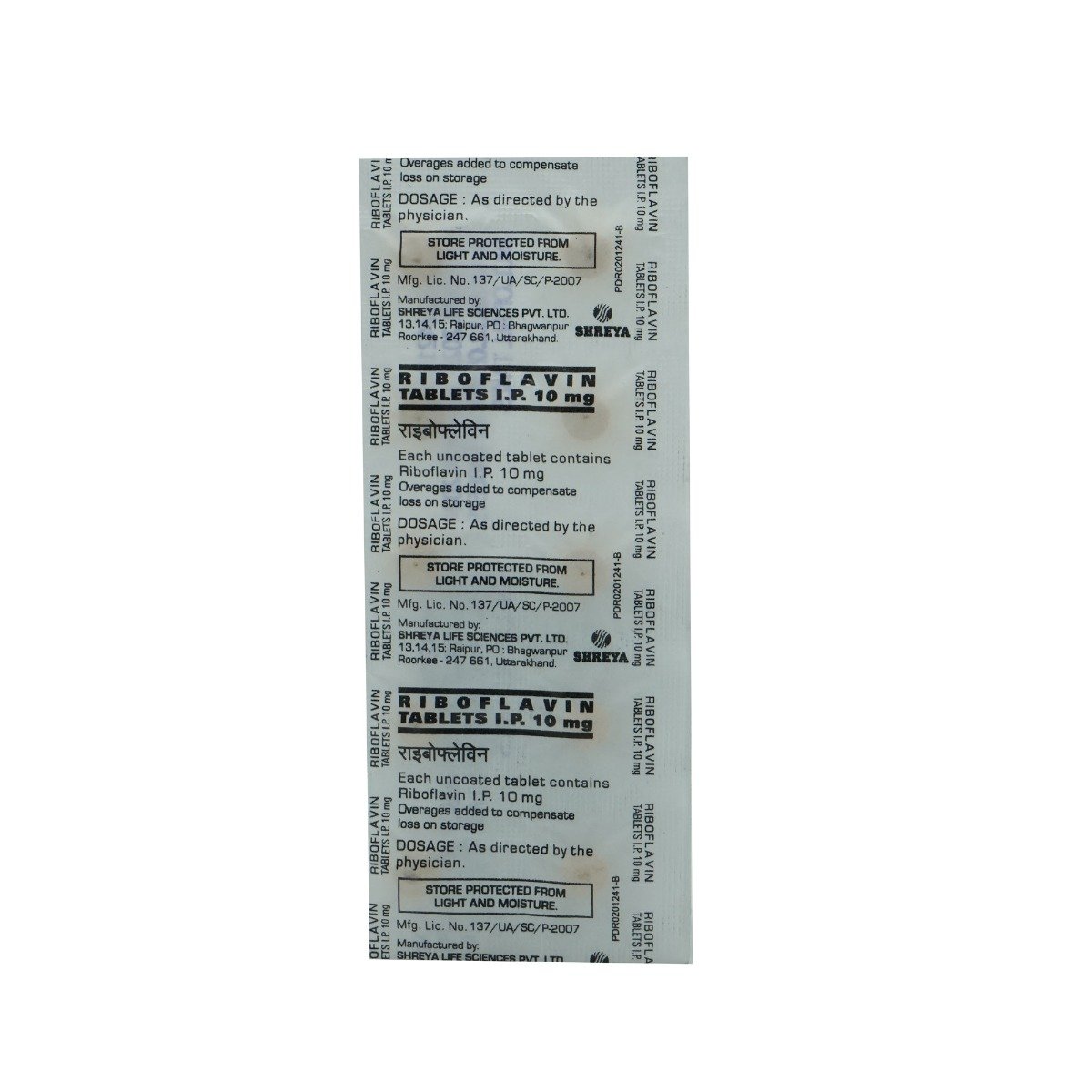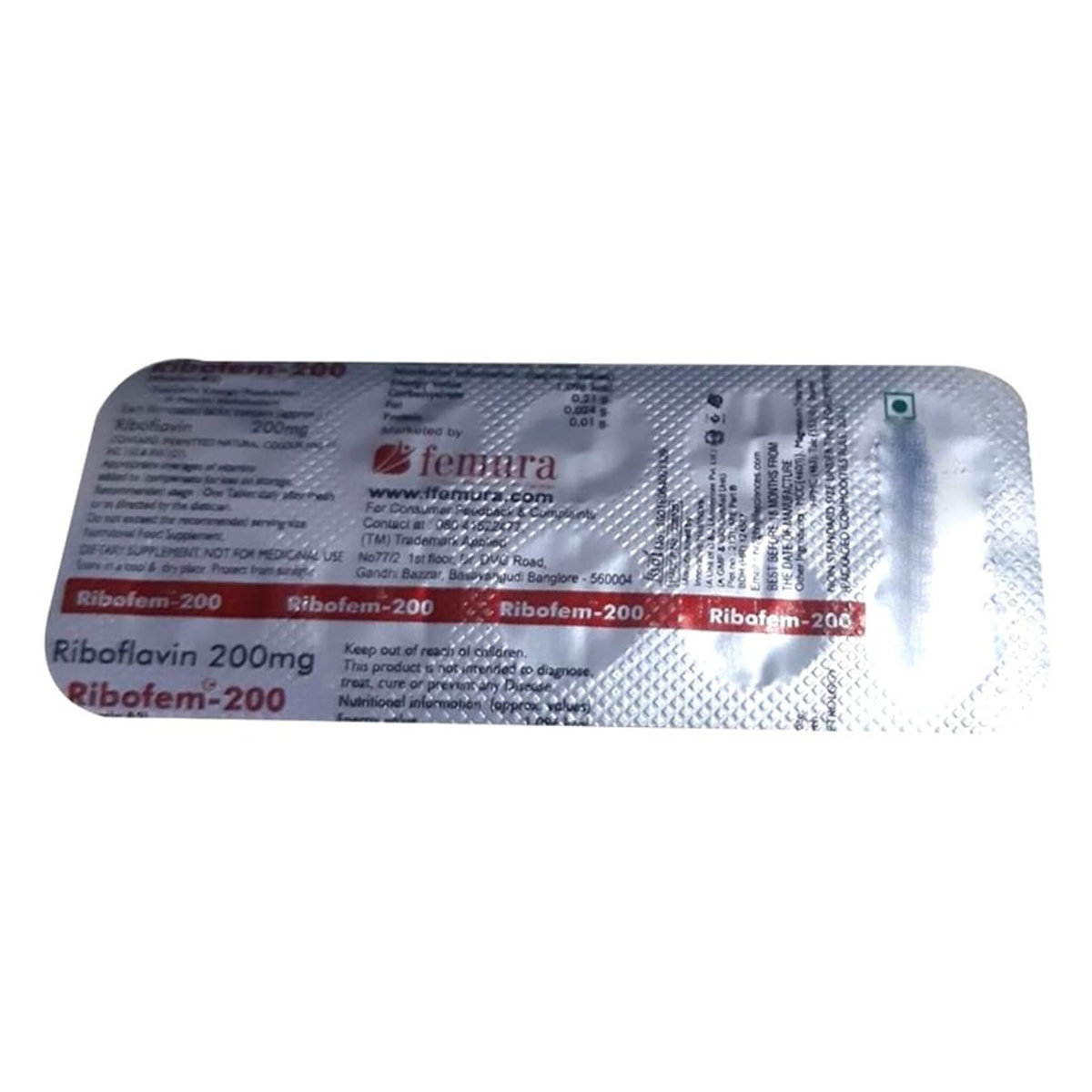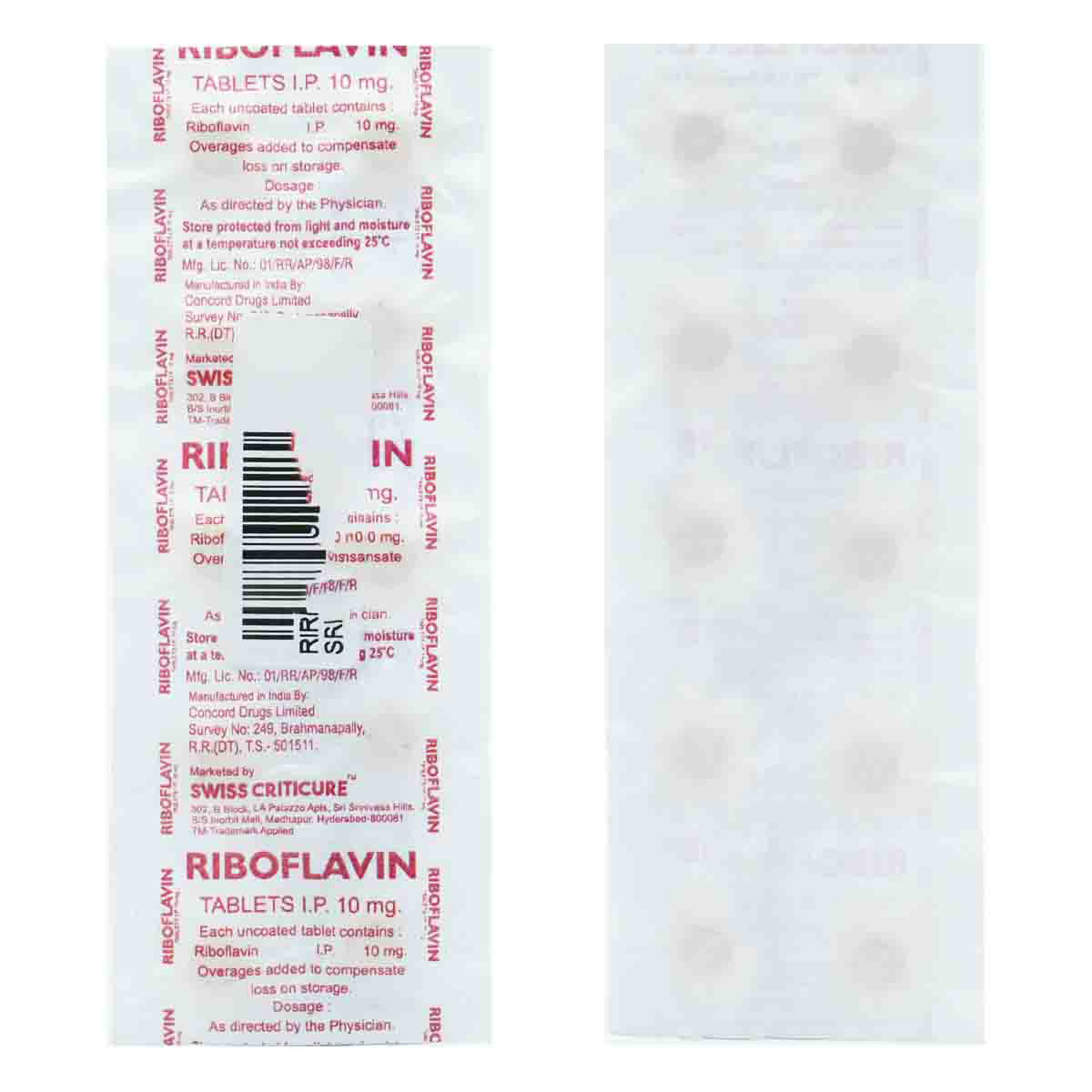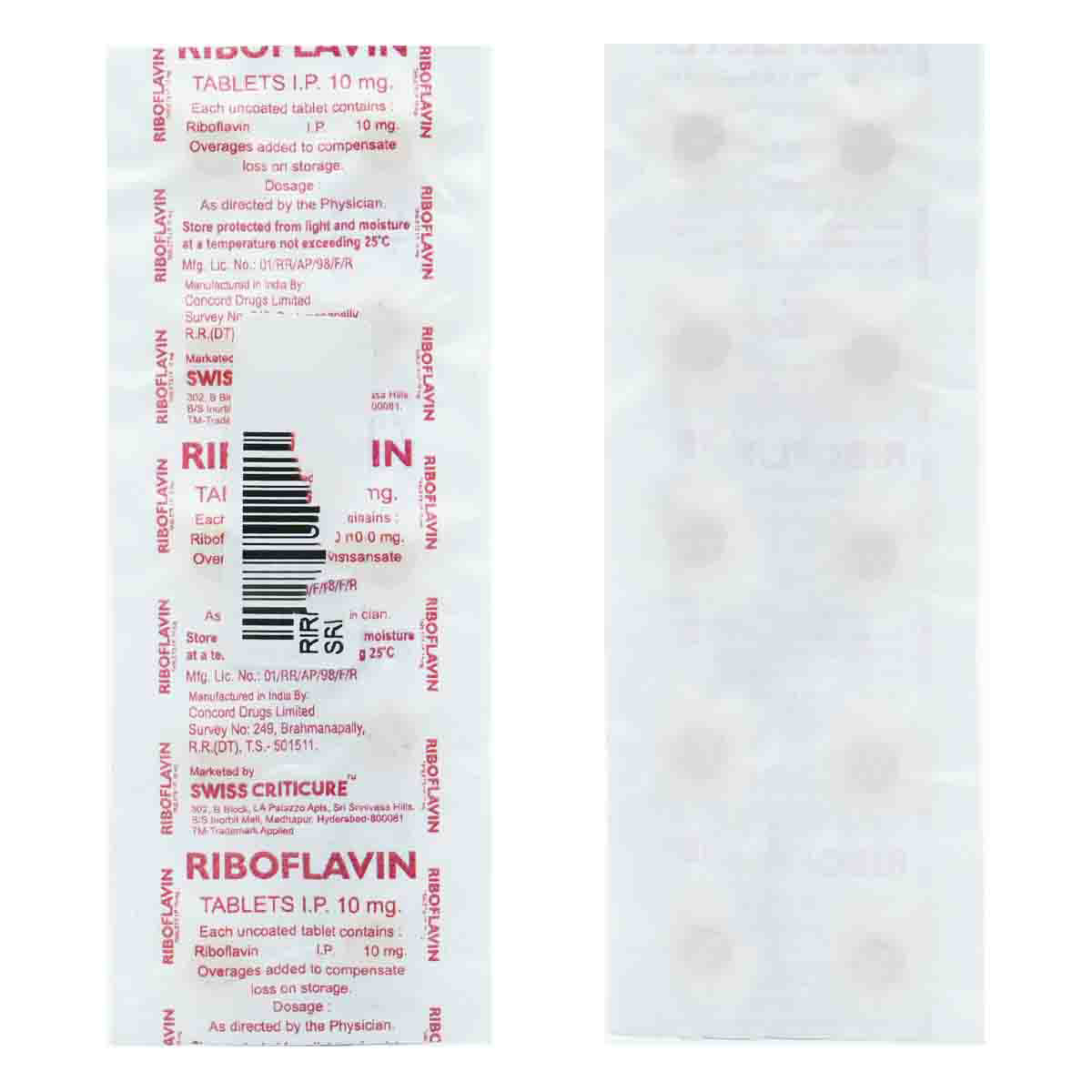Riboflavin
About Riboflavin
Riboflavin is used to treat riboflavin (Vitamin B2) deficiency. Riboflavin, also known as vitamin B2, is necessary for the proper functioning of the skin, the digestive tract, the blood and the brain. It is also useful in the treatment of migraine and keratoconus.
Riboflavin contains 'Riboflavin'. It helps convert food (carbohydrates) into energy (glucose), which can be taken up by the body's cells. It also acts as an antioxidant, protecting cells from free radical damage.
Riboflavin may cause side effects such as nausea, vomiting and bright/yellow urine. Most of these side effects do not require medical attention and will resolve gradually over time. However, you are advised to talk to your doctor if these side effects persist.
Inform the doctor if you are allergic to any of the components of Riboflavin. Please inform your doctor of any diseases or allergies you have. Consult your physician before using Riboflavin during pregnancy or if you are breastfeeding.
Uses of Riboflavin
Medicinal Benefits
- Riboflavin is used to prevent and treat riboflavin (vitamin B2) deficiency, also known as Ariboflavinosis.
- It helps in the management of mouth sores, migraines, and keratoconus associated with riboflavin deficiency.
- Riboflavin plays a vital role in converting food into energy, supporting overall metabolism and vitality.
- It aids in the formation of coenzymes necessary for energy production, cellular respiration, and antibody synthesis.
- Riboflavin helps deliver oxygen to body cells, promoting healthy growth and tissue repair.
- It supports the normal functioning of the nervous system, skin, eyes, and red blood cells.
- Riboflavin contributes to optimal growth, energy balance, and overall development of the body.
Directions for Use
- Riboflavin can be taken with or without food, or as advised by your doctor.
- Follow your doctor's recommendations on the dosage and timing of this medication to achieve optimal results.
- Swallow it as a whole with a glass of water.
- Do not crush, chew, or break it.
Storage
Side Effects of Riboflavin
- Nausea
- Bright, yellow urine
Drug Warnings
- Inform the physician if you are allergic to any of the components of Riboflavin.
- Keep your healthcare professional informed if you suffer from any diseases or allergies.
- Exercise caution with Riboflavin in case of liver disease, as it can affect riboflavin metabolism.
- Be cautious while using Riboflavin with tetracycline antibiotics, to avoid an interaction.
- Consult your doctor before using Riboflavin during pregnancy or if you are breastfeeding.
- Let your doctor know if you are taking any other medicines, including supplements and herbal products.
Drug Interactions
Drug-Drug Interactions: Riboflavin may interact with tetracycline antibiotics (doxycycline, oxytetracycline, demeclocycline, minocycline).
Drug-Food Interactions: No interactions found.
Drug-Disease Interactions: No interactions found.
Drug-Drug Interactions Checker List:
Safety Advice

Alcohol
cautionRiboflavin should be used with caution with alcohol to avoid an interaction. Please consult your physician in case of any concerns.

Pregnancy
cautionNot enough studies have been done on pregnant women. Please consult your physician in case of any concerns.

Breast Feeding
cautionNot enough studies on the subject exist. Please consult your physician in case of any concerns.

Driving
consult your doctorRiboflavin is unlikely to affect your ability to drive.

Liver
cautionLiver disease can decrease the absorption of Riboflavin. Please consult your physician in case of any concerns.

Kidney
consult your doctorRiboflavin is probably safe on the kidney. Please consult your doctor in case of any concerns.

Children
consult your doctorRiboflavin is safe for use in children when recommended by the doctor.
Habit Forming
Diet & Lifestyle Advise
- Load up on a nutrient-rich diet focused on Vitamin B. Riboflavin-rich foods include milk, meat, eggs, nuts, fortified flour and green vegetables.
- Stay hydrated by drinking plenty of water. This can help ease the symptoms of migraine.
- Doing weight-bearing exercises such as brisk walking, jogging, tennis, or even dancing can be very useful in promoting overall physical health. However, do not over-exert yourself if you feel too tired. Muscle training activities such as yoga and Pilates can also be very helpful in promoting good physical health.
- Avoid stress and try meditation and psychotherapy to reduce stress and to take care of your mental health.
- Limit your alcohol intake. Drink only in moderation.
Patients Concern
Disease/Condition Glossary
Ariboflavinosis: Ariboflavinosis is a disorder caused by Riboflavin deficiency in the body. It is characterised by mouth sores. Other symptoms include skin changes, oedema and swelling of the lips and mouth, a magenta coloured, inflamed tongue, lesions in the corner of the mouth, swollen, cracked lips and reproductive problems.
FAQs
Riboflavin belongs to the group of vitamin supplements primarily used to treat riboflavin (Vitamin B2) deficiency.
Riboflavin works by participating in various energy-producing pathways in the body, converting food into energy.
Riboflavin absorption is compromised in patients suffering from liver disease. Therefore, Riboflavin must be used with care in liver disease. Consult your doctor in case of any concerns.
Yes. Riboflavin can be effective in dealing with typical mouth sores as it restores the integrity of the lining of the mouth. However, there can be many causes of mouth sores. Consult a doctor in case of any concerns.
The recommended daily allowance (RDA) of riboflavin is 2.5 mg in males and 1.8 mg in females.
In case you miss a dose, take it as soon as you remember. However, if it is almost time for the scheduled dose, skip the missed dose and revert to the original dosing schedule.
Riboflavin contains Riboflavin (vitamin B2) as its active ingredient.
Riboflavin may cause side effects such as nausea, vomiting and bright yellow urine in some people. If these side effects persist or worsen, please consult your doctor.








